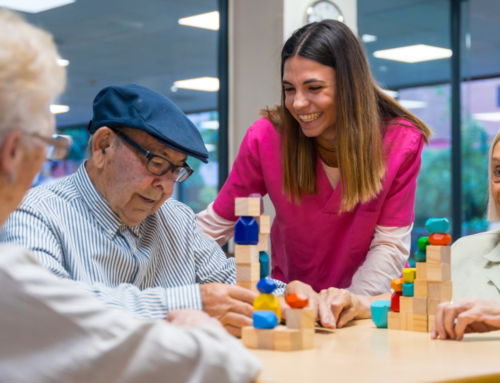Share This Story!
The Basics of Speech Therapy
Speech therapy can be particularly helpful for seniors dealing with medical issues like strokes, cancer, brain injuries, or dementia. A speech language pathologist (SLP) handles speech disorder diagnoses and treatments. Many SLPs work with specific population groups such as the elderly. SLPs help patients with communication, cognitive skills, and swallowing. SLPs work with other healthcare providers to identify the patient’s issues and create a treatment plan that helps the person perform daily activities.
Dysphasia vs Aphasia
Dysphasia and aphasia are two conditions that SLPs work to treat. The primary cause of dysphasia is brain damage. This damage could be the result of a stroke, head injury, tumor, infection, or neurodegenerative diseases. Healthcare providers classify dysphasia as a language disorder. The disorder affects the brain’s ability to turn thoughts into spoken word.
Aphasia is a communication disorder that affects the patient’s ability to read, write, and speak. Like dysphasia, aphasia is caused by damage to areas of the brain. Aphasia sufferers can also have difficulty understanding words and language from other people. To further classify the disorder, healthcare providers have identified several subgroups.
Benefits of therapy
Due to the severity of these disorders, speech therapy offers a few different benefits for senior citizens. Each type of therapy provides the patient with tools that can be used to make communicating with others easier.
1. Different types of therapies help struggling patients
Speech therapy is an umbrella term used to describe various kinds of treatments for patients. Once the SLP performs a comprehensive speech therapy evaluation on the patient, the SLP can provide a therapy that addresses the issue. Here is a list of common therapies:
- Constraint-induced therapy
- Visual speech perception
- Feeding modifications
- Muscle retraining
- Singing
2. Have trouble swallowing?
Believe it or not, speech therapy helps people suffering from dysphagia. Feeding modifications teach senior citizens how to eat and swallow when they have trouble doing so. Without proper feeding and hydration techniques, a senior citizen can become dehydrated and malnourished. Hydration techniques can be as simple as using a straw to intake fluid.
3. Learn new ways to communicate pain or discomfort
Seniors struggling with speech problems will not be able to express their thoughts which becomes particularly frustrating when the person suffers from a physical impairment. Singing is a form of speech therapy that allows the patient to make melodic intonations to convey words.
4. Improve cognitive skills
Cognitive skills help a person understand something using thoughts, senses, and experience. Seniors with speech therapy issues have trouble conveying thoughts to others so an SLP might use art therapy or constraint-induced therapy to teach the patient how to articulate themselves using words.
Speech therapy for seniors
Always consult a healthcare provider to learn more about speech therapy for seniors. Providers can refer patients to SLPs and work together providing the best possible care for the patient.





